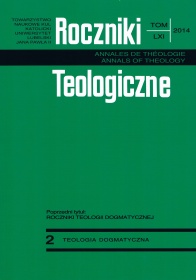Theological Interpretation of the Beginnings of Jesus’ Messianic Mission According to J. Ratzinger/Benedict XVI
Abstract
At present in theological literature there are numerous studies of the figure and history of Jesus Christ. One of the most important ones is J. Ratzinger/Benedict XVI's Jesus of Nazareth. The author chooses the method that in his opinion leads to the interpretation of the Phenomenon of Jesus Christ in the way of christologia perennis, perennial Christology. He does not reduce his approach either to the very “Jesus of history”, or the “Christ of the faith” only. He unites the two ways the historical one and the religious one into one. In this way the Pope connects the modern purely historical-linguistic approaches with the metahistorical ones. He joins the top-down Christology with the grass-roots Christology on the basis of the complete realism of the language of the Bible. Moreover, the Jesus of the Gospel is a figure that is well based in history, albeit not reducible to history only. Ultimately Benedict XVI/J. Ratzinger derives this method from personalism that connects phenomenal, in-depth, doctrinal and ontological hermeneutics. J. Ratzinger also remarks that the authors of the Holy Writ are not autonomous, but they are subjects that is “God’s people” of the Church that is the ever alive subject of the Gospel. Hence, respectively, a fragment of the Writ has to be interpreted in the light of the whole. As a result we obtain speaking in advance a most realistic, true, and at the same time mystic and eschatological image of Jesus.
Copyright (c) 2014 Roczniki Teologiczne

This work is licensed under a Creative Commons Attribution-NonCommercial-NoDerivatives 4.0 International License.





